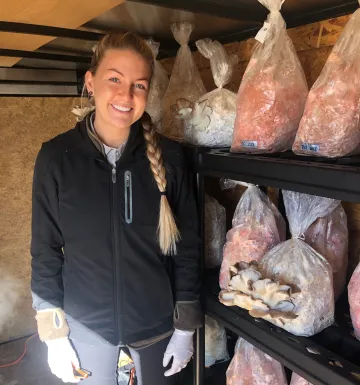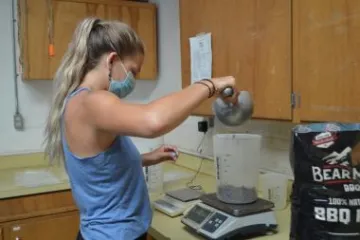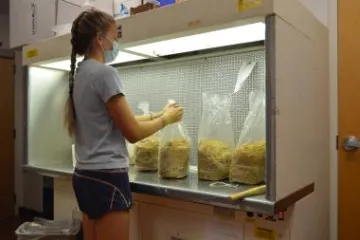Meet Charlotte Bonner.

Charlotte is a graduate student at the University of Arizona's Controlled Environment Agriculture Center (CEAC) obtaining her MS degree in the Plant Sciences program. With help from her advisor, Dr. Barry Pryor, Charlotte has been studying specialty mushroom cultivation.
Originally from Plymouth, Minnesota, Charlotte obtained her undergraduate degree from the University of Minnesota. Her passion for the controlled environment agriculture (CEA) field initially began when she moved to Orlando, Florida to work for Disney World’s hydroponic greenhouse attraction, Living with the Land. There, Charlotte maintained a 5,000 sq. ft. greenhouse that produced various crops hydroponically—including tomatoes, eggplants, lettuce, cucumbers, strawberries, pumpkins, and peppers. She said that her experience working at Disney World’s greenhouse facility and sharing her knowledge with guests solidified her decision to pursue a master’s degree in CEA.
Charlotte joined the UA-CEAC family in the fall of 2019. Before starting her degree, she attended our annual CEA Short Course to get a better idea of our program and what area she wanted to focus on. There, Charlotte spoke with CEAC’s Dr. Barry Pryor to see what areas of research might be available. She said that his contagious enthusiasm for mushroom cultivation grabbed her interest and ultimately led her to pursue this topic for her thesis and research.
So why do we focus on mushrooms in CEA learning? Nearly all commercial mushroom production occurs in controlled environment facilities, where proper temperature and humidity must be controlled for optimal production. However, mushrooms require very little light and can be cultivated on waste streams such as agricultural waste, landscape waste, and many kinds of post-consumer waste, making them an energy efficient, sustainable food source for consumers.
Specialty mushrooms, such as oyster mushrooms, shiitake, and lion’s mane, are a great source of protein, vitamins, and antioxidants. However, the production of high quality, nutritious mushrooms requires an optimal composition of their growth substrate in order for them to colonize the substrate quickly and produce abundant, nutrient dense, fruiting bodies.
Charlotte’s mushroom research focuses on optimizing the balance of lignin vs cellulose in specialty mushroom substrate in order to increase mushroom yield. She is also exploring new substrate mixtures utilizing new, locally-sourced waste streams. This ultimately is done in hopes to make the industry more profitable for farmers while simultaneously decreasing the amount of waste from other industries.

“Agricultural wastes like straw, coffee grounds, vines, and pretty much any plant biomass that is not consumed by humans creates a lot of waste to deal with,” Charlotte explained while discussing the process. “In order to ensure future sustainability and economic vitality for growers, the cultivation process must be streamlined to ensure the nutritional needs of the mushrooms are met in an environmentally sustainable way.”

But, Charlotte's research hasn't been without challenges.
“One of the biggest challenges is the unpredictability in production. The mysterious mushroom is a real thing. You can prepare and inoculate two, even five bags of substrate exactly the same and one bag will produce at 100% biological efficiency and the other won’t even fruit.” The reasons for this irregularity are not known, but this clearly needs to be resolved.
Even though she has faced obstacles, Charlotte hasn’t lost sight of her goal—to improve the accessibility of fresh, nutritious produce to people everywhere, especially in urban areas. For the mushroom industry, she wants to increase understanding of substrate utilization by oyster and lion’s mane mushrooms so that growers can optimally select and combine substrates that are available to them in their local area. Once she graduates, she hopes to use her knowledge gained through our program to continue work in the mushroom industry for the benefit of both the industry and consumer alike.

